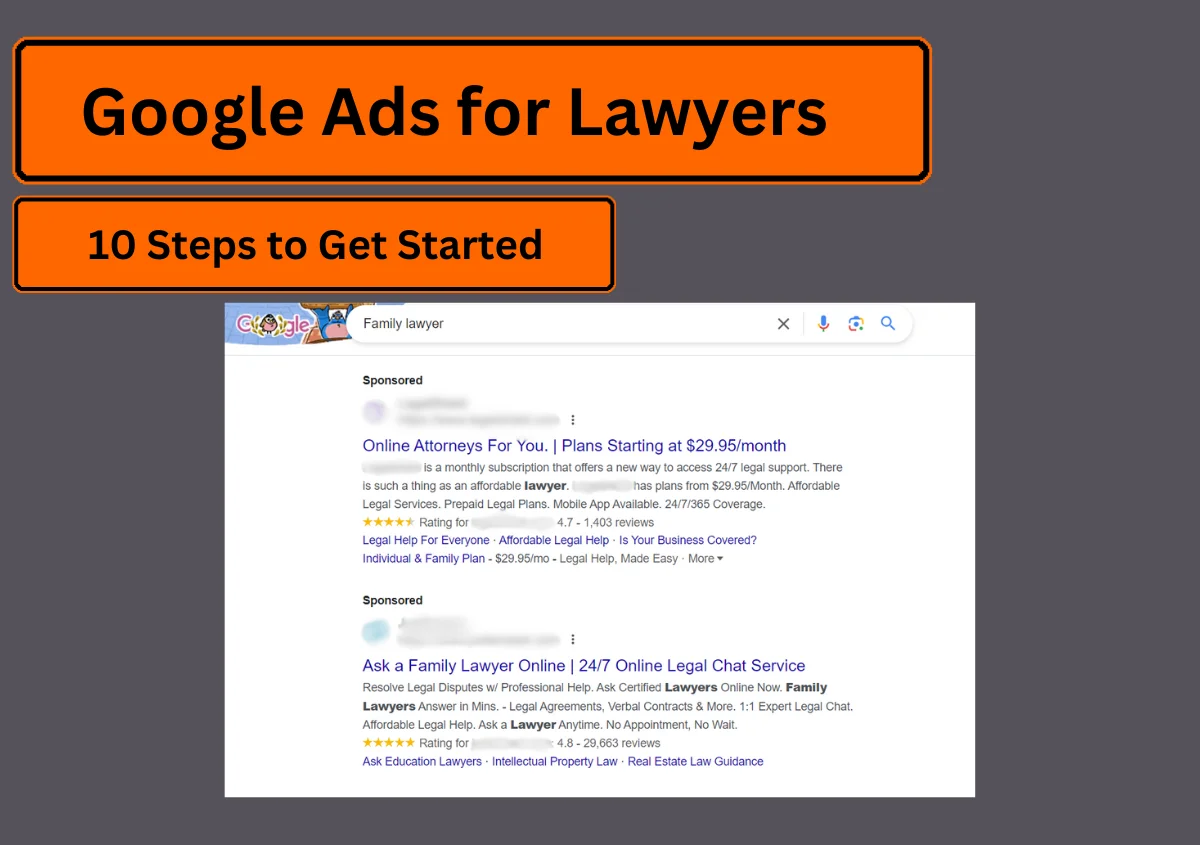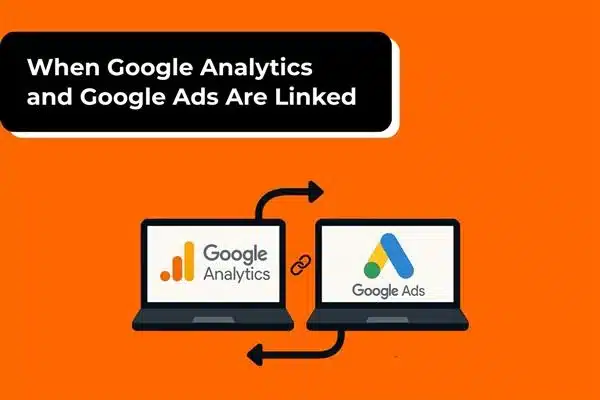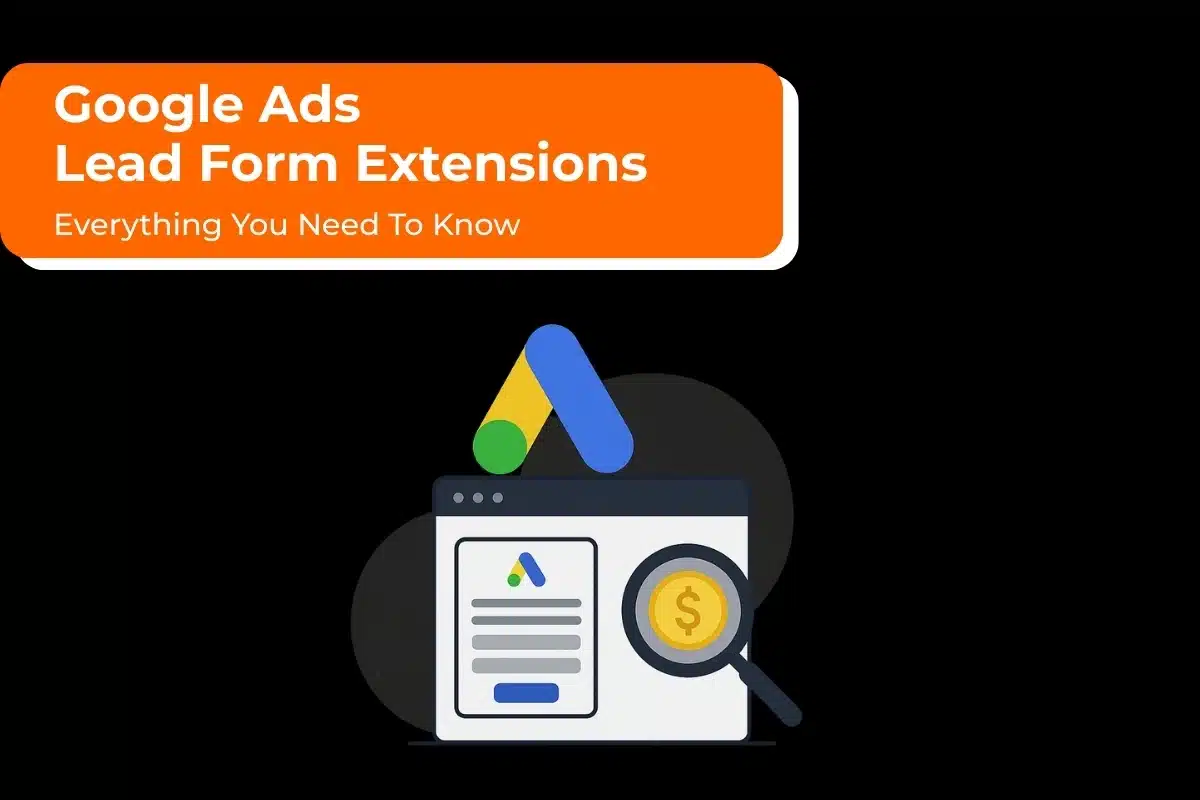Client acquisition, especially for new law firms, is not easy, but a data-driven marketing strategy goes a long way in helping you get cases. This is exactly where Google Ads for lawyers helps.
More people than before look for legal services and advice online. So it makes sense to advertise about your firms and how you can help potential clients. With Google Ads, you can do it easily, even if your firm is not well-established.
What is Google Ads for Lawyers?
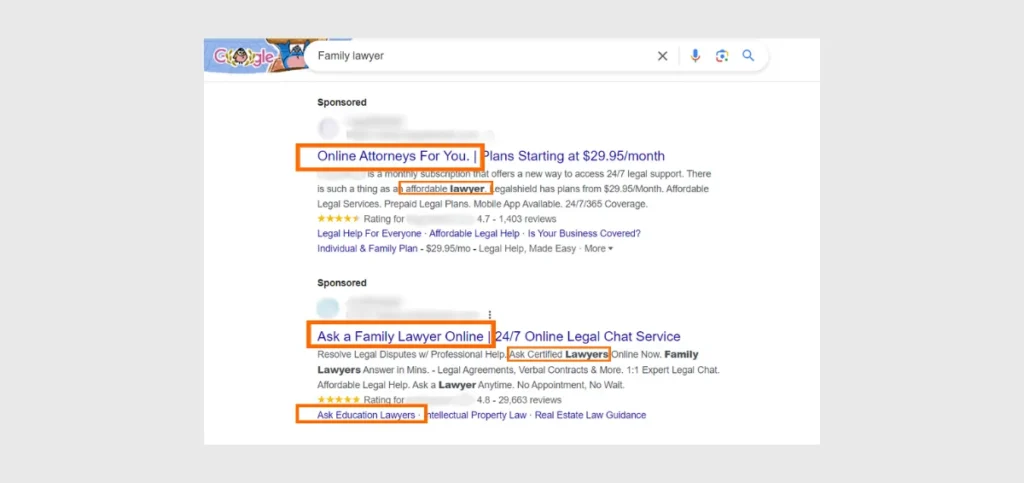
Google Ads is a paid-per-click (PPC) platform that lawyers can use to advertise their services on search engine result pages. It is a cost-effective marketing model wherein you pay not when someone views your ad but when they click on it.
Google Ads runs on auction, a process in which advertisers bid on specific keywords or placement of their ads. Your bid influences the amount you will spend for actions like a click.
Compelling Google Ads for lawyer businesses based on intense keyword research enables attorneys to gain quick visibility. It allows you to promote your practice and get more clients.
Does Google Ads Work Well for Law Firms?
Yes. If structured correctly, Google Ads for lawyer business results in a huge increase in website traffic and lead generation. It serves the needs of people who are actively seeking legal assistance and allows you to get potential clients quickly. The major ways in which Google Ads help lawyers include the following:
- Improved conversion rate: If you use the right keywords to create Google Ads and use the right bidding approach, you will notice a higher conversion rate compared to organic marketing. Moreover, by using negative keywords and regularly optimizing campaigns, your conversion rate will keep increasing.
- Greater visibility through Local Service Ads (LSAs): Local Service Ads get triggered when potential clients look for attorney’s services for which they are likely to pay, and so have a high rate of conversion. Some of the areas best suited for this type of Google Ads are Bankruptcy law, Business law, Contract law, Criminal defense law, Disability law, DUI law, and Estate law.
- Best for legal issues that cannot be discussed publicly: Google Ads for lawyers in certain areas work more effectively than others. These are the areas that people hesitate to discuss openly, such as personal injury, bankruptcy, criminal offense, and employment issues.
Should I Invest in Google Ads for My Law Firm?
If your goal is to acquire leads and conversions at competitive costs for the long term, investing in Google Ads will be an excellent option. In addition to getting leads, paid ads also enable you to increase the online presence of your law firm. When combined with a good search engine optimization (SEO) strategy, paid ads can dramatically enhance your practice’s credibility. In turn, it will bring more visitors and potential clients to your website.
However, your Google Ads should be thoroughly optimized regularly. You need to spend considerable time monitoring your campaigns and finding out what is working and what should be improved. This is where the assistance of experienced PPC experts proves beneficial. You can delegate the task of running and managing paid ads to them and be assured of witnessing impressive growth month after month.
Best Types of Google Ad Campaigns for Lawyers
Search Ads, Display Ads, and Local Service Ads are the three types of Google Ad campaigns that lawyers can use.
1. Search Ads
Google Search Ads appear on the search engine results pages when someone types a keyword related to your service. This can be a ‘family lawyer’ or a ‘personal injury firm.’ Depending on your campaign settings, your ad will not only appear on the search results but also show on Google Play and Google Maps. Google Search Ads have a headline, short description, and ad assets that give additional information about your service. These ads have a high potential for conversion as they appear in response to a user who actively looks for a service using the keyword.
2. Google Display Ads
Google Display Ads or Google Display Network Ads are visual ads about a law firm that shows on various digital platforms and apps. These are the platforms that are in partnership with Google to host ads. You can choose the position of your ad placement on the website or app. The Display Ads do not lead to direct conversions since they are not prompted by users actively seeking legal support. Instead, these ads are ideal for improving the exposure of your practice among your target client segment.
3. Local Service Ads
Local service ads show on the search engine result pages when people in a specific geographic location search for a service. These ads show at the very top of the search results the moment a query is triggered. LSAs display the name of your firm, client reviews, ratings, city, contact number, and many crucial pieces of information that enable you to collect leads through phone calls and messages.
You need to be eligible for LSAs to set them up. Google also requires you to prove that your practice is trustworthy by asking you for proof of insurance and license. Once set, you pay for cost per lead and not clicks in LSAs.
How to Create Google Ads for Lawyer Business?
Now that you are familiar with the benefits of Google Ads for lawyer businesses, and the different types of ads, let’s dive into the process of setting them up. Follow these stepwise instructions to build and optimize your campaigns.
1. Set Up Your Account and Select a Specific Ad Campaign
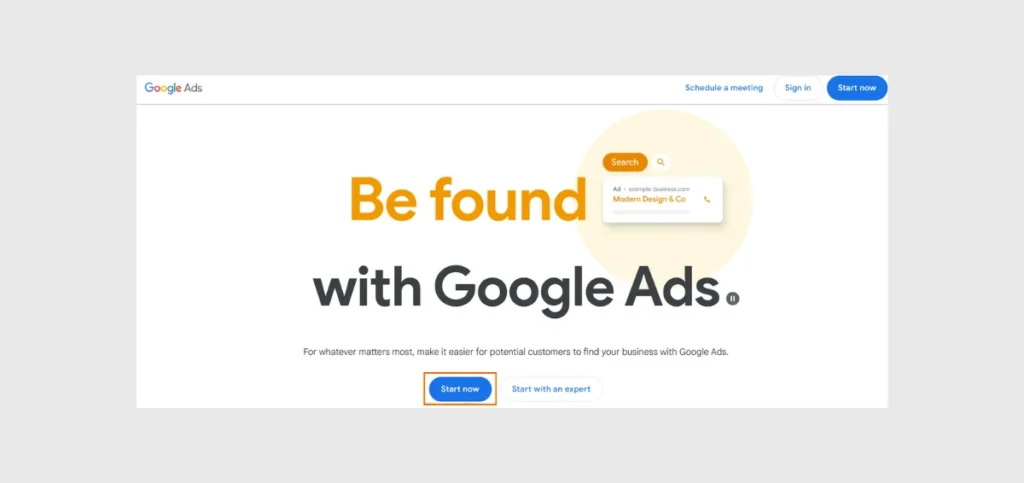
Get started easily by setting up a Google Ads account for your law firm. Go to ads.google.com and select ‘Start now.’ From there, follow the prompts and provide the information asked.
You can set up a PPC ad to get more calls, leads, and visitors to your office, or engage with your YouTube. Everything is straightforward and self-explanatory.
When it comes to campaigns, choose either the Search Network Only campaign or the Display Network Only campaign. The former is ideal for lead acquisition and shows on sites where people are actively looking for your services. The latter is good for enhancing your reach and reputation as it shows ads on websites with display advertisements.
2. Do Thorough a Keyword Research
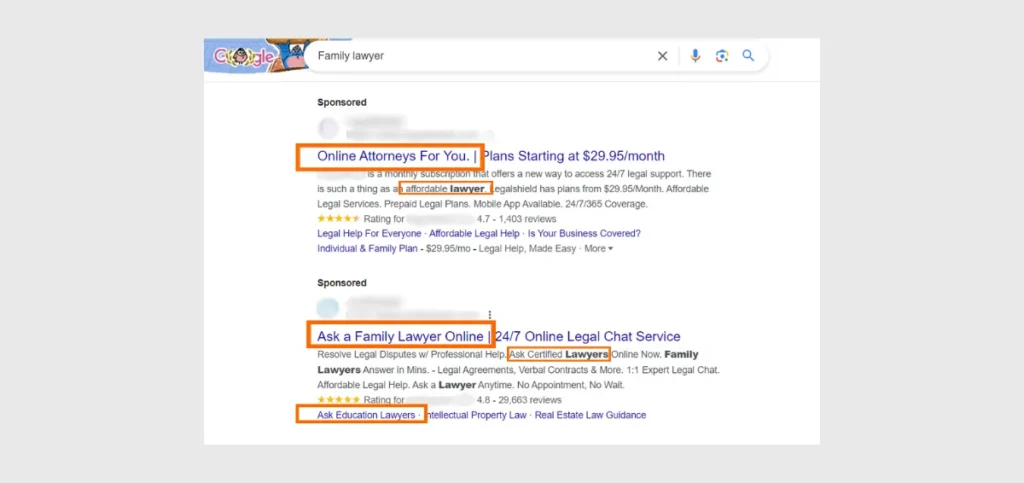
It is essential to get a laser-focused keyword list to increase the visibility and click-through rate of your law firm’s Google Ads campaign. Legal keywords are quite costly (as much as $9), which can consume your budget quickly. So, focus on choosing the most valuable search terms.
Keep in mind the following points when finding keywords for the campaign:
- Assess the cost for every bid, competition, and search volume of keywords related to your practice on Google Ads Keyword Planner (in the ‘Tools and Settings’ drop-down menu at the top of the ad account).
- Select keywords that are relevant to your law practice and area.
- The keywords should have low to medium difficulty scores and higher search volumes (Use paid tools like Google Keyword Planner, SEMRush, and AHREFS to gain in-depth keyword metrics)
- Long-tail keywords, i.e., keywords with three or more words, are easier to rank for from an organic standpoint and at times are more relevant for paid ads also. These can be terms like ‘personal injury lawyer in California’ or ‘personal injury attorneys near me.’
3. Explore Different Keyword Match Types
People look for lawyers and their services in many ways. Based on the pattern they search, Google shows up your ads. There are three keyword match types you can use to show potential clients your ads and generate leads and conversions.
Broad Match
If you use broad match type keywords for your ads, Google shows your ads not only for that keyword but also for its variations like synonyms and related search terms. So, if your broad match type keyword is ‘family lawyer,’ your ad will appear to those who are looking for ‘types of family law cases,’ ‘family lawyer Houston,’ and even ‘family law attorney jobs.’
Using Broad Match keywords can be detrimental to your budget as doing so makes the ad visible to those who may not be interested in your services are are just browsing to learn more
Phrase Match
With these keywords, the phrase you want should show in the precise order you specify. Thus, you gain significant control over the queries for which your ads will appear. This, in turn, increases the chances of expanding your reach among more targeted potential clients.
If your Phrase Match keyword is ‘family lawyer,’ Google will show your ad for searches like ‘family lawyers,’ ‘family lawyer near me,’ ‘family lawyer in my city,’ and the like.
Exact Match
Exact Match keywords are the best for lawyers using Google Ads to increase clicks and conversions. This is because you get clicks from clients who are looking for exactly the services you offer, in this case, ‘family lawyer.’ You can be sure that your money is going toward highly relevant searches and yielding results.
4. Use Negative Keywords
Negative keywords are words you combine with your shortlisted keywords to prevent your law firm’s ads from showing for queries that seem similar to your target keywords but are not relevant. By using them, you optimize your ad budget for potentially irrelevant searches and strengthen your focus on a highly targeted keyword list.
So, if someone types ‘family lawyer jobs in Toronto, you can add ‘jobs’ to the negative keyword list, and it will save your ad from being shown to people looking for employment opportunities.
Negative keywords are of three types, each with a particular function.
Broad Match Negative Keyword
Use the above type of negative keyword to eliminate all search queries having certain words. If you are a lawyer who doesn’t deal with domestic violence cases, include ‘domestic violence’ in your negative keyword list. Searches with this keyword will not trigger your ads.
Phrase Match Negative Keyword
Use the Phrase Match negative keyword to exclude a phrase in the precise order. So, if your Phrase Match negative keyword is ‘family lawyer,’ then only searches with it order won’t show the ads you created. However, if the terms ‘family’ or ‘lawyer’ are searched for separately or variations of these terms are used, then your ad will appear.
Exact Match Keyword
This type of keyword eliminates all the exact match search terms. So, for searches like ‘family lawyer, ‘ your ad will not show, but for phrases like ‘family lawyer nearby’ or ‘best family lawyer,’ your ad will be visible.
Read Also:- How to Add Negative Keywords in Google Ads?
5. Place Keywords Correctly in the Ad Copy
After shortlisting PPC keywords for your law business, you need to use them appropriately for a well-optimized ad copy. Include the keywords in the following parts of your ad copy:
- Display path: The keywords should appear in 15 characters in the display path of the ad copy. An example of the display path is www.lawfirm.com/practice-area/location.
- Ad headlines: Most click on ads only after reading the headlines. They should have keywords, most importantly. Each headline has a limit of 30 characters. Include your target search terms in headline 1, your law firm’s USP in headline 2, and the name of your business in headline 3. Here’s an example: Family Lawyer | Free consultation | Apex Law Firm
- Descriptions: You will see four descriptions when creating the ad copy. They should have the keywords, USPs, and other things that make your law business unique. Ensure that the descriptions relate well with the content on your landing page. This will increase the Quality Score of your ads and the likelihood of a better ROI.
6. Enhance the Targeting of Your Ads
To find the right clients for your law business, use Google Ads location targeting. This increases the campaign’s visibility to your preferred location or a radius around an area, or location groups. Location groups can be places of interest, your law firm’s locations, or tiered demographics.
However, as lawyers licensed to practice in a single state, you cannot use the broad geotargeting feature. Instead, target people specifically in your region or a little further.
Similar to location targeting, you can set your ads to show people belonging to a certain age, income level, gender, and parental status.
7. Use Dynamic Keyword Insertion (DKI) for Greater Visibility
DKI enables your target keywords to be automatically filled using the phrases that the searcher employs. So, your ad will show for a term like [your city] lawyer and also for [your city] family lawyer. The automatic change in terms of the ads according to the query makes the ad hyper-personalized, leading to high-quality Scores and CTRs.
Note that DKI works when the searcher’s query is not beyond 25 characters. Otherwise, the ad will appear in the original text.
9. Choose a Bidding Option Wisely
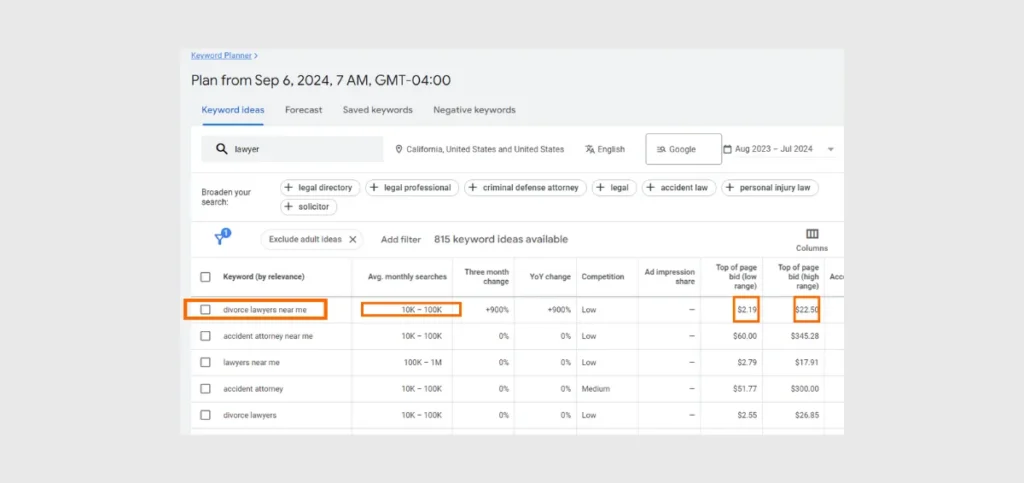
You have two bidding options in PPC:
- Manual bidding: You set the maximum money you want to pay for each click on a keyword or your ad placement. It gives you greater control over your PPC budget.
- Automated bidding: Google adjusts your bids in real-time through techniques like Target CPA, Target ROAS, Maximize clicks, and Maximize conversions. Automated bidding is less time-consuming and more accurate. However, you don’t have much control over your spending.
If you are starting with Google Ads for your law business, we would recommend you start manual bidding on high-intent keywords. Once you get more campaign data and find more relevant keywords and match types, you can explore automated bidding techniques.
10. Monitor Attorney ads
No Google Ads is successful if you do not carefully monitor post-launch. Monitoring allows you to continuously optimize or restructure law firm campaigns for maximum profit. You should check the following tabs in your ad account to understand the progress:
- Status: This tab shows whether your attorney ad is running or not. Some common status indicators are
- Under review
- Eligible
- Approved
- Approved (non-family)
- Approved (adult)
- Approved (limited)
- Disapproved
- CTR (Click-through Rate): If the CTR is below 1%, you need to restructure the ads because users are not finding them effective.
- Avg. CPC (Cost-per-Click): It is the money you pay for each click made by the searcher.
8. Use Local Service Ads If Applicable
Select law practice specializations are eligible for using Local Service Ads. As mentioned, they rank at the top of the search results for local region-specific queries, such as ‘Clearwater Car Accident Attorney.’
When using LSAs, you will pay only for the leads generated directly from them and not through the PPC model used by Google Ads. Such leads have a high potential for conversion, and they are usually ready to act.
Note that Google uses a preset rate pay-per-lead arrangement for LSAs. You cannot achieve a higher place in the search results using a larger budget.
Read Also:- How to Set Manual CPC in Google Ads?
5 Mistakes to Avoid When Using Google Ads for Lawyers
Certain mistakes while setting up and running Google Ads can become costly and prevent you from getting the result you want. So, make sure you are not making the following blunders:
1. Adding Keywords Unnecessarily
Many law firm owners stuff their ad copies and landing pages with keywords to rank well. However, Google algorithms can easily detect keyword stuffing and prevent your ad and website from appearing in the search results. There is no use in creating ambiguous headlines and descriptions filled with a keyword because it has a high search volume. The text makes no sense, and your potential client cannot understand keyword-stuffed sentences. This practice degrades the user experience and decreases the credibility of your website.
2. Not Using Relevant Ad Assets
Ad assets or extensions provide more useful information about your practice. Ignoring their use is a big mistake that can lose you a potential client. For instance, if your ad shows for ‘corporate lawyer in Charlotte,’ but it does not have callout extensions, site link extensions, and phone numbers, how will the user contact you? They will scroll past your ad and select another lawyer who has provided these details.
3. Not Protecting Your Ad from Appearing for Irrelevant Searches
You unknowingly harm your click-through rate and conversions by forgetting to use negative keywords. If you are a divorce lawyer in Houston, you don’t want your ad to be shown to people who want counseling or mediation services. This is where negative keywords are beneficial. By using them, you exclude the terms for which your ad should not appear. So, your ad becomes more targeted and specific and, thus, gets clicks from clients who are highly likely to convert.
4. Not Using Long-Tail Keywords
Long-tail keywords are long phrases, such as ‘personal injury lawyer near me,’ and are usually made by users at the bottom of the funnel. These users are more likely to convert because they have specific motives. A head keyword or a single-term keyword, such as ‘attorney’ or ‘patent attorney,’ is difficult to rank for because it is very competitive. Also, people typing such keywords may not have the intent to convert but may want to know more about the service. However, a long-tail keyword, like ‘patent attorney near me in Raleigh,’ is much more specific. It conveys that the user wants to connect with a patent attorney, specifically in their city. Such a long-tail keyword has a higher chance of getting you conversions.
5. Not Making Data-Driven Decisions
High-converting Google Ads are driven by analytics. If you haven’t set up Google Analytics 4 on your ad’s landing pages, it’s the right time to do so. With its help, you can find the duration for which people are on your page and bounce rate and accordingly optimize it. Also, monitoring the performance of Google Ads for law firms is crucial. Google Analytics allows you to determine the performance of the ads against metrics like cost-per-click (CPC), cost-per-acquisition (CPA), return on ad spend (ROAS), and conversion rate.
How Much Do PPC Ads for Lawyers Cost?
The cost of Google Ads for lawyer business depends on the keywords targeted, the city, and the competition level of those keywords. In general, you should have a budget between $1,600 to $10,000 monthly to run profitable ads and get higher clicks and calls than your competitors.
If the number of lawyers bidding on certain keywords is higher, the cost of the ads per click will increase. For example, not many lawyers will bid on a term like ‘dog bite lawyer.’ The cost of the ads per click for this keyword will be as low as $35. However, if it becomes a popular keyword and more lawyers start bidding on it, the cost can go as high as $85.
Note that personal injury, car accident, and criminal law are some of the highly competitive areas of law. So, the cost for every click on keywords associated with these areas is also high. Also, the cost will be twice or thrice more for the keywords associated with New York City than, say, Toronto. So, if you reside in New York, you must pay more for PPC than in Toronto.
Conversely, low to medium-competition areas, such as Wills & Estates, probate, and property, can do well with a lower budget.
Read Also:- How to Improve Conversion Rate in Google Ads?
Concluding Words
Using effective Google Ads for lawyers will enable you to enhance your credibility, reach, and number of clients in your practice. However, you should find the most relevant keywords and choose your bidding strategy wisely. It is also imperative to monitor the campaigns and optimize them. Start slowly in the beginning and focus more on understanding the nature of Google ads rather than launching campaigns. Assess what your competitors are doing and, accordingly, create a campaign that helps you get ahead of them. Website Pandas will assist you in getting the most leads and conversions from Google Ads. We have been helping lawyers with PPC throughout the US and will be happy to understand your needs. Schedule a consultation today.

